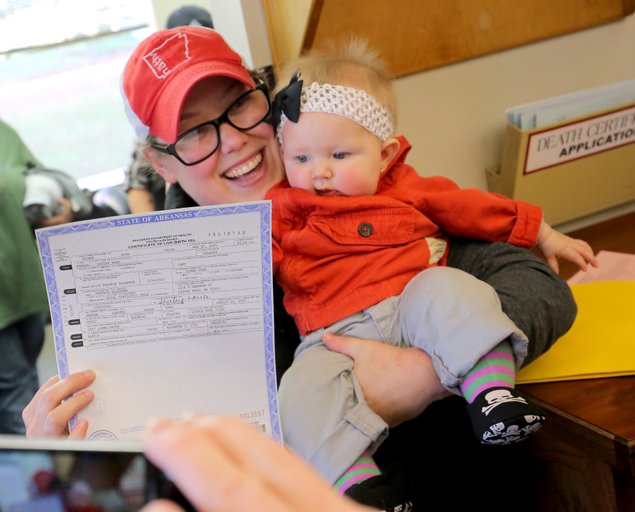Photo via Arkansas Online
Written by Joseph Railey
ABSTRACT
In a brief per curium opinion, the Supreme Court found Arkansas’ birth certificate statute to be unconstitutional because it treated same-sex couples differently. The Court stated that the statute “denied married same-sex couples access to the ‘constellation of benefits that the stat[e] ha[s] linked to marriage.’”
DISCUSSION
The case began when two, married, same-sex couples in Arkansas decided to have a child through artificial insemination. Upon the birth of the children, each of the couples wrote in two mothers’ names on the birth certificate paperwork. However, when the couples received the birth certificates back, the State had listed only the mother who carried and gave birth to the child.
At the time, Arkansas’ birth certificate statute provided that “the mother is deemed to be the woman who gives birth to the child” and that, “[i]f the mother was married at the time of either conception or birth, . . . the name of [her] husband shall be entered on the certificate as the father of the child.” One exception to this rule is when the child is born via artificial insemination, where Arkansas allows for only the mother’s name to be listed, unless the father consents to his name being listed as well.
The trial court held that the statute conflicted with Obergefell v. Hodges, 135 S. Ct. 2071 (2015), as it “categorically prohibited every same-sex married couple . . . from enjoying the same spousal benefits which are available to every opposite-sex married couple.” The Arkansas Supreme Court, however, disagreed and held that the statute focused on the relationship between the biological mother, father, and child rather than on the “marital relationship of husband and wife.” As such, it held that the statute did not conflict with Obergefell and was, therefore, constitutional. Thereafter, the United States Supreme Court granted certiorari and reversed the Arkansas Supreme Court’s decision, remanding the case.
In its opinion, the United States Supreme Court noted the disparate treatment.
As already explained, when a married woman in Arkansas conceives a child by means of artificial insemination, the State will—indeed, must—list the name of her male spouse on the child’s birth certificate. And yet state law, as interpreted by the court below, allows Arkansas officials in those very same circumstances to omit a married woman’s female spouse from her child’s birth certificate. As a result, same-sex parents in Arkansas lack the same right as opposite-sex parents to be listed on a child’s birth certificate, a document often used for important transactions like making medical decisions for a child or enrolling a child in school.
In Obergefell, the Court specifically addressed this issue. Where some of the petitioners in Obergefell sued to be listed as parents on their child’s birth certificates, the Obergefell Court expressly identified birth certificates as part of the “terms and conditions” of marriage.
Justices Gorsuch, Thomas, and Alito dissented, noting that summary reversal should not have been applied in this case and that the state’s arguments for only listing biological parents on a birth certificate were permissible. The justices also opined that, as the petitioners only sought relief under the state’s birth certificate registration statute (§ 20-18-401), and not the statute relating to artificial insemination (§ 90-10-201), the Court impermissibly applied that provision.
••••••••••••••••••••••••••••••••••••••••••••••••••
Sources Cited
Pavan v. Smith, 198 L.Ed.2d 636 (2017).
Obergefell v. Hodges, 135 S. Ct. 2584 (2015).
Ark. Code Ann. § 20-18-401 (West 2017).
Ark. Code Ann. § 9-10-201(a) (West 2017).

